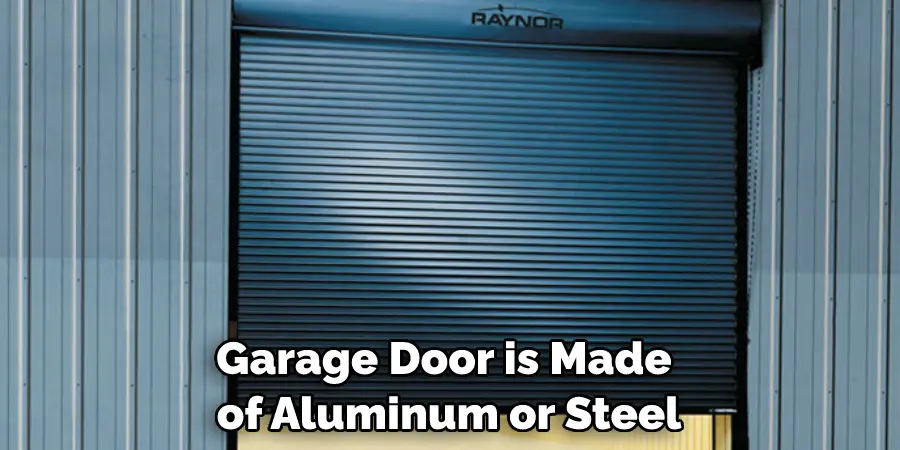Garage doors come in various materials, but aluminum and steel are two of the most common. Both have their own advantages and disadvantages, and it’s important to choose the right material for your needs. Here’s a quick guide to help you tell if your garage door is aluminum or steel.
Aluminum garage doors are lightweight and low maintenance. They’re also resistant to rust, making them a good choice for coastal areas. However, they can be dented more easily than steel doors and may not be as energy efficient.

Steel garage doors are heavier than aluminum ones but are also more durable. They’re a good choice for areas with severe weather conditions, as they won’t warp or crack in extreme temperatures. Steel doors are also more energy efficient than aluminum ones, which can help keep your home cooler in summer and warmer in winter. In this blog post, you will know in detail how to tell if garage door is aluminum or steel.
Summary: Aluminum doors tend to be lightweight and have a smoother texture, while steel doors are heavier and have a grainier texture. You can also tap the door with a metal object to hear the sound it makes. Aluminum doors produce a higher-pitched sound, while steel doors produce a lower-pitched sound. Finally, you can use a magnet to test whether the door is made of steel, as magnets will stick to steel but not aluminum.
Step by Step Processes for How to Tell if Garage Door is Aluminum or Steel
Step 1: Observe the Surface Appearance
One of the first steps to determine if your garage door is made of aluminum or steel is by observing its surface appearance. Aluminum garage doors often have a smoother, more matte finish, while steel doors typically have a slight texture or grain pattern. Although some finishes can mimic the appearance of the other material, this observation can be a starting point to narrow down the possibilities.
Step 2: Check for Rust
Since aluminum does not rust, the presence of rust on your garage door can be an indication that it is made of steel. Look for rust spots, especially around the edges, seams, or any areas where the paint has chipped or scratched. Keep in mind that rust-resistant coatings on steel doors may prevent rust formation, so the absence of rust does not guarantee an aluminum door.
Step 3: Test with a Magnet
Steel is a magnetic material, whereas aluminum is not. To determine the material of your garage door, perform a simple magnet test. Take a small magnet and place it against the door. If the magnet sticks to the surface, your garage door is likely made of steel. If the magnet does not stick, it suggests that the door is made of aluminum. Be aware that some steel doors may have a thin aluminum or vinyl coating, so the magnet test may not be conclusive in every case.
Step 4: Examine the Door’s Weight
Aluminum is a lighter material compared to steel. To get an idea of your garage door’s weight, carefully lift it manually, either by disengaging the opener (if your door has one) or by lifting it from the bottom edge. A lighter door that is relatively easy to lift is likely made of aluminum, while a heavier door that requires more effort to lift is probably steel. However, this test may be inconclusive for doors with varying levels of insulation or thickness.
Step 5: Inspect the Door’s Thickness
Steel garage doors are typically thicker than aluminum ones. Measure the thickness of your garage door by using a measuring tape or ruler. Standard steel doors usually range between 24 and 28 gauge, while aluminum doors are often around 0.05 to 0.06 inches thick. This thickness difference can help you determine the material of your garage door, although some custom or high-quality doors may not follow these standard measurements.
Step 6: Look for Manufacturer Information
If your garage door still has the manufacturer’s label or sticker, it may provide information about the material used. Check for any labels or markings on the door’s interior or exterior, as well as on the door’s side or bottom edges. The manufacturer’s website or product manual may also provide information about the door’s construction.
Step 7: Check the Door’s Sound
Aluminum and steel garage doors produce different sounds when struck. Gently tap the door’s surface with your knuckles or a soft object like a rubber mallet. Aluminum doors tend to produce a hollow or echoing sound, while steel doors emit a more solid, dull sound. This method is not foolproof, as insulation or additional layers can affect the sound, but it can provide additional evidence to help determine the material.
Step 8: Evaluate the Door’s Resistance to Dents
Aluminum is generally more prone to dents and damage compared to steel. If your garage door has visible dents or seems more susceptible to damage from impacts, it may be made of aluminum. However, this method should be used with caution, as different types of steel doors can have varying levels of durability and dent resistance.
Step 9: Consult a Professional
If you are still unsure about the material of your garage door, consider consulting a professional. A garage door technician, contractor, or the door’s manufacturer can help you identify the material and provide expert advice. They may be able to provide additional insights based on the door’s construction, components, or specific features that are not easily discernible to the average homeowner.
Step 10: Research the Installation Date and Brand
If you know when your garage door was installed or the brand of the door, you can use this information to help determine the material. Look up the brand and model of your garage door online or contact the manufacturer to inquire about the materials they used during that time period. Some brands may have primarily manufactured aluminum or steel doors during specific years, which can give you a better idea of the door’s material.
Step 11: Examine the Door’s Components
Garage doors are often constructed using more than one material, and the components may provide clues about the main material used. For example, if your garage door has steel rollers or hinges, it may be more likely that the door itself is also made of steel. However, keep in mind that the components alone may not provide definitive evidence, as doors made from one material can still incorporate components made from other materials.
Step 12: Consider the Door’s Insulation
The type of insulation used in your garage door can also provide hints about its material. Steel garage doors often have foam insulation, while aluminum doors typically use a reflective or radiant barrier insulation. By examining the insulation type, you can gather more information about your door’s construction.
By following these steps and using a combination of visual inspection, physical tests, and research, you can determine whether your garage door is made of aluminum or steel. Knowing the material of your garage door can help you make informed decisions about maintenance, repairs, and future upgrades to improve your garage’s energy efficiency, durability, and overall performance.
8 Tips for How to Tell if Garage Door is Aluminum or Steel
- If you’re not sure whether your garage door is made of aluminum or steel, there are a few ways to tell. One way is to look at the material itself. Aluminum is typically lighter in color than steel and may have a slightly different sheen.
- Another way to tell the difference is by looking at the thickness of the door. Aluminum doors are typically thinner than steel doors. Finally, you can also tell by the price. Aluminum doors are often more expensive than steel doors.
- If you’re unsure, your best bet is to consult a professional. Keep in mind that both aluminum and steel doors require regular maintenance.
- Inspect the door regularly for signs of wear and tear, and make sure to lubricate the hinges and tracks monthly. If you notice any damage, have it repaired as soon as possible to prevent further deterioration.
- In most cases, aluminum and steel doors can be repaired relatively easily. However, if the damage is severe, it may be necessary to replace the door entirely.
- Consider your budget and needs when deciding between an aluminum or steel door. Steel is a good option if you’re looking for a durable door that requires little maintenance.
- However, aluminum may be the better choice if you’re on a tight budget. Remember that both types of doors have pros and cons, so do your research before making a final decision.
- Whatever type of door you choose, make sure to follow the manufacturer’s instructions for installation and care.

What Are the Benefits of Each Material?
Aluminum garage doors offer several benefits over steel doors. They are lighter in weight, which makes them easier to operate. They also resist corrosion and are not susceptible to denting or dinging as easily as steel doors. Aluminum doors can also be manufactured in a variety of styles and colors to match the look of your home.
Steel garage doors offer more durability than aluminum doors. They are also less likely to dent or ding and more corrosion-resistant. Steel doors can be painted any color you desire, but they are also available in various wood-grain finishes that can give your door a natural look.
So, which is the better choice for your garage door?
It really depends on your personal preferences and needs. An aluminum door may be the best choice if you want a lightweight door that is easy to operate.
A steel door may be the better option if you are looking for a durable door that will resist wear and tear. Whichever material you choose, consult a professional garage door installer to ensure proper installation.
You Can Check It Out Seal Uneven Garage Door
How Can You Tell if a Garage Door is Made of Aluminum or Steel?
There are a few ways to tell if a garage door is made of aluminum or steel. One way is to look at the door itself. Aluminum doors will typically have a smooth, glossy finish, while steel doors will have a more textured appearance.
Another way to tell the difference is by feeling the door’s weight. Aluminum doors are much lighter than steel ones, so if you can easily lift them, they are likely made of aluminum.
Finally, you can check with the manufacturer to find out the door’s material. If you cannot determine the material yourself, this is the best way to be sure.

Is It Necessary to Contact With Consultants to Tell if Garage Door is Aluminum or Steel?
If you’re unsure about what type of garage door you have, it’s always best to consult with a professional. They’ll be able to tell you for certain what material your door is made of and offer advice on the best way to care for it. With that said, there are a few ways you can try to determine what kind of garage door you have on your own.
One way to tell if your garage door is made of aluminum or steel is by looking at the surface. Aluminum doors will typically have a smoother, more polished look, while steel doors may appear more textured or dull. Another way to tell the difference is by testing the door with a magnet. Steel is magnetic, so if the magnet sticks to the door, it’s likely made of steel. On the other hand, aluminum is not magnetic, and the magnet won’t stick.
If you’re still unsure, your best bet is to consult with a professional. They’ll be able to tell you definitively what kind of garage door you have and offer advice on the best way to care for it.
You Can Check It Out Replace Bottom Panel of Garage Door

Conclusion
To conclude, if you’re unsure whether your garage door is aluminum or steel, there are a few key ways to tell. First, check the door’s weight – aluminum doors are much lighter than their steel counterparts.
Second, look at the door’s surface – aluminum doors will have a smooth, non-rusting finish, while steel doors may be rougher and have rust spots.
I hope this article has been beneficial for learning how to tell if garage door is aluminum or steel. Make sure precautionary measure is being taken while dealing with the garage doors.
I am Rick. I grew up helping my dad with his handyman service. I learned a lot from him about how to fix things, and also about how to work hard and take care of business. These days, I’m still into fixing things- only now, I’m doing it for a living.
I’m always looking for new ways to help people grow and develop. That’s why I have created this blog to share all my experience and knowledge so
that I can help people who are interested in DIY repair.

